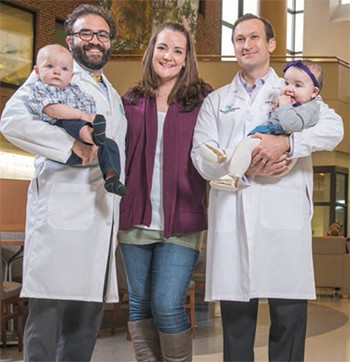Preserving Fertility While Fighting Cancer

“Jim said, ‘We might as well start a family when we’re young,’” Kelly says. “He convinced me. And I’m very lucky he did.”
That’s because trying to become pregnant may have saved Kelly’s life.
The Collevechios, of Boothwyn, had been trying for about six months to have a baby when Kelly’s Ob/Gyn suggested fertility testing. After a test showed a possible problem with one of her fallopian tubes, she was referred to Dr. Isaac Sasson, MD, PhD, FACOG, a reproductive endocrinologist (fertility specialist) with Main Line Health.
Dr. Sasson ordered more tests, which revealed another problem—a mass on Kelly’s right ovary, which turned out to be cancerous.
Kelly, a nurse at Riddle Hospital, was stunned. Symptoms of ovarian cancer can include bloating, pelvic or abdominal pain, trouble eating or feeling full quickly, and urinary symptoms (urgency or frequency). Women who experience these symptoms almost daily for more than a few weeks should see their doctor. But signs of ovarian cancer are often silent, and Kelly hadn’t experienced any symptoms at all.
“I had no idea anything was wrong,” Kelly says. “The only reason my doctor ordered tests was because I was trying to get pregnant. Since I was already at stage 3, we were fortunate we found the cancer when we did.”
Dr. Sasson quickly referred Kelly to Dr. David Holtz, MD, FACOG, Director of the Division of Gynecologic Oncology at Main Line Health. In September 2013, Dr. Holtz removed Kelly’s right ovary and fallopian tube in a procedure at Paoli Hospital. He also recommended chemotherapy.
Teaming Up to Optimize Results
Kelly and Jim still hoped to start a family, but they were concerned about how the chemo might affect Kelly’s fertility. Drs. Sasson and Holtz worked together and determined there was enough time to retrieve eggs from Kelly’s remaining ovary before she began chemotherapy.
Kelly’s ovary was stimulated with hormones to produce several mature eggs. The eggs were then removed, fertilized in the laboratory with Jim’s sperm, and frozen for use after Kelly’s cancer treatment.
In February 2015, after six rounds of chemotherapy and several months of recovery, Kelly was ready to complete her fertility preservation treatment. Her fertility team transferred two embryos to her uterus. Thirty-six weeks later, on October 12, 2015, Kelly delivered healthy twins at Riddle Hospital.
Know Your Fertility-Sparing Options
If you’ve been diagnosed with cancer, you may already know that treatments can affect your reproductive health. The good news is that there are options to help preserve fertility.
“The best approach is having the oncologist collaborate with the reproductive endocrinologist early—before cancer treatment begins,” Dr. Holtz says. “We want to make sure couples understand the methods we can use to minimize the chance for infertility without sacrificing the quality of cancer care.”
One option may be to suppress the activity of the ovaries during chemotherapy with oral contraceptives or medications to preserve ovarian function, Dr. Holtz says. In addition, sometimes doctors can use a chemo drug that’s less toxic to the reproductive system but still effective against the cancer.
Embryo freezing, which the Collevechios used, may be a good option if it’s safe to delay your cancer treatment for two to three weeks. This is how long it takes to stimulate the ovaries for egg retrieval.
Dr. Sasson’s practice has a dedicated team that works with cancer patients to ensure their fertility care starts quickly so their cancer treatment can follow as soon as possible.
“We see patients with cancer within a day or two because we want to make things as easy for them as we can,” Dr. Sasson says. “These are challenging times for them, and it’s important they feel emotionally supported through every phase of care.”
Enjoying Every Minute
Kelly, now 30, acknowledges her journey hasn’t been easy. But she considers herself lucky. She says she and Jim couldn’t have asked for more from their Main Line Health team.
“The babies are starting to crawl, and we’re having so much fun with them,” Kelly said in May. “Brielle’s a fabulous sleeper, but James needs a little more TLC to calm down, so I rock him to sleep every night. I worked hard to have these babies, so I will rock him to sleep every night until he’s 18!”
“I’m savoring this time because I know they’ll never be this small again,” Kelly adds. “I don’t take any day for granted, and I don’t think I ever will again. I’m happy and healthy and trying to just enjoy life as it comes.”
It’s important to know the potential risks to you and your baby during pregnancy–and to address any medical issues you may have before you get pregnant. If you’re facing cancer, heart disease, or other risk factors, Main Line Health offers maternal-fetal medicine and fertility specialists who can help guide you to a healthy pregnancy.
 Content you want, delivered to your inbox
Content you want, delivered to your inbox
Want to get the latest health and wellness articles delivered right to your inbox?
Subscribe to the Well Ahead Newsletter.
